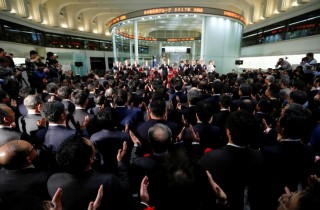Loading
Search
▼ Over 80% Of Major Japanese Companies Expect Economy to Grow in 2018
- Category:Other
TOKYO - More than 80% of major Japanese companies surveyed expect the nation's economy to grow in 2018, citing a recovery in corporate capital investment and personal spending, but also remained cautious about hiking wages, the results of a Kyodo News survey showed Tuesday.
The percentage is up sharply from 58% that forecast growth in a similar Kyodo survey a year earlier, indicating Japanese companies are increasingly optimistic about the country's economic prospects.
Of a total of 109 companies surveyed between late November and early December, including Toyota Motor Corp and Sony Corp, 89 firms, or 82%, said they think the economy will expand this year, followed by 17 firms which said they expect growth to be flat. None projected a slowdown.
Asked in a multiple-choice question why they think the economy will expand, 59 companies cited stepped-up business spending, 45 a recovery in individual consumption, 34 expanding exports and 24 an improving U.S. economy.
As for the course of stock prices, 49 companies said they expect the Nikkei Stock Average, which rose for the sixth straight year in 2017, to continue to gain in 2018, versus 31 that said the index will likely be flat. No company projected a stock decline.
Regarding Prime Minister Shinzo Abe's request for a 3% wage increase, Japan Inc. showed a largely unenthusiastic response. Only five companies said they support the premier's request while 61 said a wage increase is a matter that should be decided by each company and industry.
Asked about their wage policy for 2018, 14 companies said they will raise wages, 12 said wages will stay flat while the most common answer -- undecided -- was given by 72.
Most companies, at 85, said their retained earnings have been increasing. But only one company said it will increase wages when it has extra funds to spare, while 19 said such funds will be spent on boosting capital investment.
On what economic steps they want the Abe administration to introduce, regulatory reform was cited by the largest single group of 43 companies. Meanwhile, 51 expressed concerns about the government's fiscal reform policy.
As for the Bank of Japan's aggressive monetary easing, the largest group of 32 companies said the central bank should continue with the monetary policy for the time being while paying attention to price moves and the economic situation, while eight said the policy should be maintained until the bank's 2% inflation target is achieved.
The bank has postponed the time frame for meeting the inflation goal six times since Governor Haruhiko Kuroda introduced drastic easing measures in April 2013.
The BOJ has been purchasing exchange-traded funds at an annual pace of about 6 trillion yen ($53 billion) to lift the Tokyo stock market. Only one company said the central bank should increase ETF purchases while 22 said otherwise.
© KYODO
The percentage is up sharply from 58% that forecast growth in a similar Kyodo survey a year earlier, indicating Japanese companies are increasingly optimistic about the country's economic prospects.
Of a total of 109 companies surveyed between late November and early December, including Toyota Motor Corp and Sony Corp, 89 firms, or 82%, said they think the economy will expand this year, followed by 17 firms which said they expect growth to be flat. None projected a slowdown.
Asked in a multiple-choice question why they think the economy will expand, 59 companies cited stepped-up business spending, 45 a recovery in individual consumption, 34 expanding exports and 24 an improving U.S. economy.
As for the course of stock prices, 49 companies said they expect the Nikkei Stock Average, which rose for the sixth straight year in 2017, to continue to gain in 2018, versus 31 that said the index will likely be flat. No company projected a stock decline.
Regarding Prime Minister Shinzo Abe's request for a 3% wage increase, Japan Inc. showed a largely unenthusiastic response. Only five companies said they support the premier's request while 61 said a wage increase is a matter that should be decided by each company and industry.
Asked about their wage policy for 2018, 14 companies said they will raise wages, 12 said wages will stay flat while the most common answer -- undecided -- was given by 72.
Most companies, at 85, said their retained earnings have been increasing. But only one company said it will increase wages when it has extra funds to spare, while 19 said such funds will be spent on boosting capital investment.
On what economic steps they want the Abe administration to introduce, regulatory reform was cited by the largest single group of 43 companies. Meanwhile, 51 expressed concerns about the government's fiscal reform policy.
As for the Bank of Japan's aggressive monetary easing, the largest group of 32 companies said the central bank should continue with the monetary policy for the time being while paying attention to price moves and the economic situation, while eight said the policy should be maintained until the bank's 2% inflation target is achieved.
The bank has postponed the time frame for meeting the inflation goal six times since Governor Haruhiko Kuroda introduced drastic easing measures in April 2013.
The BOJ has been purchasing exchange-traded funds at an annual pace of about 6 trillion yen ($53 billion) to lift the Tokyo stock market. Only one company said the central bank should increase ETF purchases while 22 said otherwise.
© KYODO
- January 6, 2018
- Comment (0)
- Trackback(0)


